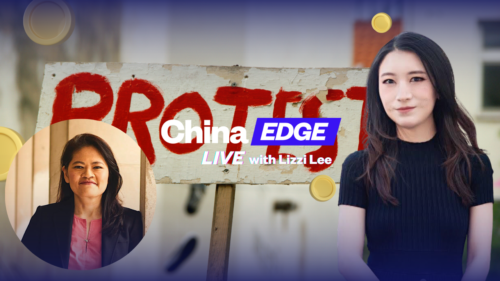China’s economy stumbles further as property market woes deepen | Live with Lizzi Lee
China’s high yield market is “over for a while,” says Alicia García-Herrero, chief economist for Asia-Pacific at French investment bank Natixis.

Good investing starts with an edge, and our ChinaEDGE intelligence database and newsletter reports help you get sharp on China. Every week, our host Lizzi Lee interviews the most knowledgeable minds on China for analysis of the ever evolving business and technology ecosystem.
In this episode of Live with Lizzi Lee:
Alicia García-Herrero, chief economist for Asia-Pacific at French investment bank Natixis, explains what analysts got wrong about China’s economic problems, unpacks the significance of youth unemployment data, and underscores the importance of real estate presales to the Chinese economy.
Below is a transcript of the video:
Lizzi: Joining me today is Ms. Alicia García-Herrero, chief economist for Asia Pacific at the French investment bank Natixis. Thank you, Alicia, for being here with me.
Alicia: It’s a pleasure.
Lizzi: So, I wanted to start with the most recent batch of China’s economic data. If we look at July’s data on retail sales, industrial production, and fixed asset investment, the data missed economists’ expectations across the board. What did analysts get wrong about China’s economic recovery?
Alicia: Two things. The first thing is to go with it in the sense that we thought pent-up demand would be there as the lockdowns were easing. And the reality is that mobility, especially intra-city mobility, not only inter-city mobility, has worsened across major cities in China. Restrictions remain not, of course, as much as in April and May, but more than in June.
So, there is a worsening in mobility and that is harming retail sales.
For fixed asset investment, we got one more thing wrong, which is that the real estate demise, which was basically last summer, would not come back in full force.
But it is coming through mortgage boycotts, which could be more dangerous even than defaults of developers because they are more widespread and more important for banks’ balance sheets.
Lizzi: Right. And what’s especially concerning is the job data we’ve seen so far. In fact, Tencent, a tech giant in China, has laid off more than 5000 employees, which is roughly 5% of its total workforce. I wonder if investors should be concerned about China’s tech giants’ future growth trajectory.
Alicia: Yes, employment is clearly a problem. We may not see that as obviously in general employment data for several reasons.
We don’t have migrant workers there. But we can sense that the extent of the lack of especially new jobs for new people in the youth unemployment, which is nearly hitting 20%, is very, very high for China.
So, this youth unemployment indeed was the one contributing to the problem with Tencent or other ICT companies- the new sectors. And those are indeed the sectors that have been harmed the most because of the regulatory crackdown.
The revenues are harmed because they can’t do what they used to do, that’s number one.
And second, because the sentiment of the consumer isn’t there. It is very negative. So that’s why they are not hiring. They’re laying off. That’s why the youth unemployment is so high in China nowadays.
Lizzi: I think you briefly alluded to the problem in the property market sector. It seems to be facing a final fallout.
We saw this dramatic wave of public defiance as Chinese homeowners in more than 100 cities threatened or started protests, refusing to repay loans on their unfinished projects.
So, what tools does Beijing still have at this point to defuse the situation? Do you think Beijing will allow property market giants like Evergrande to collapse?
Alicia: Well, if that was the intention, it’s taken a year. So, I guess it isn’t really the intention so far because they could have already let it go.
And the reason is simple. Evergrande has basically only defaulted fully on… or at least has not made payments because this is just a bond default, its offshore bondholders.
But the bulk of them is presales. 80% of developers’ funding, including Evergrande, comes from pre-sales. These presales, which is, as you said, households basically prepaying partially through a mortgage, but also their savings for a property that has not yet been built. That’s the core of the matter.
These presales, which were crucial for any developer, not only Evergrande, are not happening anymore in China. And that’s what you have even much more reputable and certainly with better financial standing developers such as Country Garden, basically having to be supported by a China Bond Insurance Corporation because they can’t issue… Even the best developers.
So it’s not only about Evergrande anymore. I don’t know what the Chinese government wants to do with it, but in a way it’s too late because others have been harmed through contagion because of this link.
Presales are presales for anybody and the households in China do not want to put the money upfront anymore.
Lizzi: Given China’s economic woes we’ve seen so far, but also given this market potential, how should investors balance the risks and returns of the Chinese market at this point?
Alicia: Well, it depends on who you are. If you operate onshore and that’s your universe of investment, given that China keeps draconian controls on outflows, then I think you need to go for what I call countercyclical sectors. Energy utilities, state-owned, state-dominated sectors.
But if you are a foreign investor and you want to jump now into Chinese assets, I think you really need to play very safe. You need to play sovereign. There’s not much paper out there, but you need to play perhaps that policy balance. I mean, very, very safe paper.
I think the high yield market, which was the darling of many investors looking for yield is over because it was so dominated by the real estate sectors. It’s not over forever, but it’s over for a while. I guess that’s where we are now.






